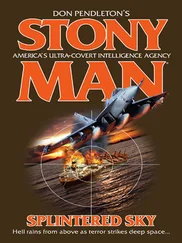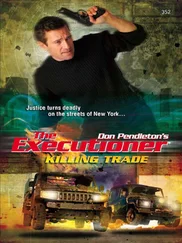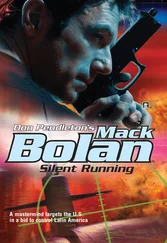“So it’s ticking….” The Interpol agent said.
“Because it’s going to explode,” Bolan finished.
“Your call, Cooper,” Rieck stated.
Bolan looked at the box, then at Becker. Without a word, he drew a dagger from his waistband. Then he spared a glance at the agent. “Get out of here, Rieck. Phone it in.”
“You sure?”
“There’s nothing you can do,” the Executioner said. “I’ll take this.”
“We could wait for the bomb squad.”
“We could if we knew how long we have,” Bolan answered. “We don’t. It’s only in the movies that the bomb has a big red LED readout staring you in the face.”
Rieck looked at him, then at Becker. “You could…I mean, it’s not your responsibility. You could get to safety.”
Bolan eyed him hard. “The hell it’s not.”
Rieck nodded. “Then I’ll stay with you. You can’t watch your own back and deal with this, too. We’ve no idea who might still be around. The people who did this might return to watch the fireworks. This apartment is not secured.” With that he checked his shotgun and stood back a few paces.
Bolan again raised his mental estimation of the Interpol agent.
Becker began muttering in agitated German. The soldier didn’t bother asking Rieck to translate; the executive was clearly convinced any tampering with the bomb would cause it to go off. He was probably right. But Mack Bolan would no more retreat to safety and watch an innocent man be blown to bits than he would pass a wounded stranger on the sidewalk. With that thought foremost in his mind, he hefted the dagger and got to work.
Using the keen edge of the compact fighting knife, Bolan made an incision around the oblong. The tape separated easily under the knife’s tip. Then, very carefully, Bolan peeled back the square of tape, making sure there were no wires or leads connecting it to the interior of the bomb. He set the tape carefully aside and took a long look at the inside of the casing. The ticking was much louder now, and came from a rotary clockwork of some kind that was spinning ominously near the bottom edge of the device. There was a fairly sizable chunk of plastic explosive buried in its heart, connected with wires to the clockwork and also to what looked like pieces of a wireless phone. Bolan leaned in and smelled the explosive.
“Semtex,” he whispered. Becker’s eyes widened. The German knew the word.
Rieck started to say something and stopped, dumbfounded, when Bolan took his phone from his pocket. Snapping it open, he used the secure phone’s camera feature to snap a picture of the interior of the bomb. He pressed the speed-dial key that would transmit the photo, scrambled, to the Farm. Then he paused, glaring at the spinning mechanism, hoping they would have enough time.
There was no telling just what Iron Thunder had thought to accomplish by rigging Becker and then leaving him. The cult didn’t seem terribly concerned with efficiency. They were more into statements, into style over substance. It was that ragged edge that separated the Iron Thunder cultists from those professional soldiers who’d attacked Rieck and Bolan at the coffee shop.
There was, however, no time to ponder that mystery now. It occurred to the soldier, as he waited, listening to the doomsday numbers fall, that there might be a camera somewhere nearby. The Iron Thunder terrorists who’d done this to Becker could be watching to see the man blown up, savoring his last fear-filled moments on earth. If the bomb was capable of remote detonation, however, it stood to reason that anyone with a finger on that button would have pressed it as soon as Bolan started to tamper with it.
The secure phone began to vibrate, and Rieck nearly jumped out of his skin. Bolan glanced at him before keying the reply button. “Cooper,” he said. Answering with his cover identity told anyone on the other end that he wasn’t alone.
“Mr. Cooper,” Aaron “the Bear” Kurtzman said, being cautious lest whomever was with Bolan could overhear, “I’ve just received your message. You’ll be pleased to know that Mr. Akira has found corresponding schematics. I’m transferring you now.”
“Understood,” Bolan said quietly.
“Akira here,” Akira Tokaido said. The young computer hacker was all-business now. He was particularly good with intricate electronic devices, which was likely why Kurtzman had tasked him with this problem. “It is a fairly conventional device,” Akira reported. “Our recognition programs have identified all of the visible components as COTS,” he continued, “commercial and off-the-shelf. That block of plastic explosive, is it C-4?”
“Semtex, by the odor,” Bolan corrected.
“Ah, the color of the photo is a little washed out. No matter. You are ready?”
“Hurry,” Bolan said.
“The two cards connected to the small transmitter on the right-hand side,” Tokaido stated. “Those are from a cell phone. They can be removed without detonating the device. Simply pull them out and yank the wires free.”
Bolan gritted his teeth, reached out and pulled the components free. Becker shut his eyes tightly. No explosion came.
“Still here,” Bolan said softly.
“Now, the timer circuit,” Tokaido said. “This is more complicated. There should be a third wire, not visible to me, somewhere near the two that are visible at the base of the rotary timer. You will have to find that third wire and cut it. Cut only the third wire.”
Bolan set the phone on the floor and used the tip of his knife as a probe, careful not to slice into the insulation covering the two wires that had been visible in the photograph. He eased these aside, prying them gently, careful not to separate them. Beneath these black wires he found a third, blue wire, well hidden and also connected to the timing mechanism.
“I have a blue wire,” he said, picking up the phone.
“The color is not important,” Tokaido said. “The third wire is the detonation one. Cutting it alone deactivates the timer. Sever either of the other two wires and the circuit closes, detonating the bomb.”
“Copy that,” Bolan said. Once more setting down the phone, he put his fingers to his lips and then placed his hand on Becker’s shoulder. He pointed at the bomb and then gestured with the dagger. The meaning was clear enough. Becker closed his eyes again and did his best to stay very still.
The timing cylinder began to spin more quickly.
“Great,” Bolan muttered.
Rieck, looking over his shoulder, gasped. Like Bolan, he could understand what that meant: the timer had run down and the mechanism was going to trigger the explosive.
Bolan cut the wire. All three men held their breath.
There was a loud metallic ping as the mechanical trigger closed.
“Well,” Bolan said. “That’s that.” He cut the straps holding the bomb to Becker’s chest, removed the device and set it next to the chair.
Becker breathed hard, muttering “thank you” in German over and over again.
“Now what?” Rieck asked. He stepped to the nearest window and glanced out, checking the street beyond.
“Now we keep moving,” Bolan said. “Obviously, Iron Thunder has been and gone. We need to follow the next lead in the chain. That means—”
“Cooper,” Rieck interrupted. “Trouble.”
“How many?” Bolan asked, checking his Beretta.
“Two more cars full of our well-armed, well-dressed friends.”
“This is starting to get repetitive,” Bolan said, nodding to Becker. “Explain to him what’s going on.” He looked around, noted the incongruously large bathroom off this room, which was apparently Becker’s study. “Tell him to get into the bathtub and keep his head down. Tell him to stay down until the shooting stops. Stay here and shoot anyone who comes through that door that isn’t me.”
Читать дальше












